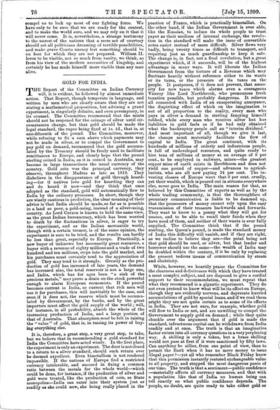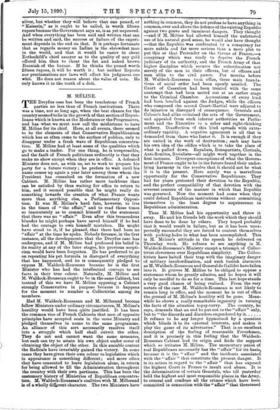GOLD FOR INDIA. T HE Report of the Committee on Indian
Currency will, it is evident, be followed by almost immediate action. That Report, though temperate in language, and written by men who are clearly aware that they are not stating a mathematical proposition, but advising a grand experiment, is singularly definite, and even peremptory, in its counsel. The Committee recommend that the mints should not be reopened for the coinage of silver until cir- cumstances change, but that gold should be made the legal standard, the rupee being fixed at is. 4d., that is, at one-fifteenth of the pound. The Committee, moreover, while refusing to fix a sum above which payments may not be made in silver, or to compel the Government to pay gold on demand, recommend that the gold accumu- lated by the Treasury should be freely used to facilitate remittances to Europe, and clearly hope that the pound sterling coined in India, as it is coined in Australia, may become in large transactions the usual currency of the country. Gold coin was the principal currency, they observe, throughout Madras so late as 1818. They disbelieve in the disappearance of gold through hoard- ing—for if natives love gold for hoarding they can and do hoard it now—and they think that once adopted as the standard, gold will automatically flow to India by the ordinary processes. In short, though they are wisely cautious in prediction, the clear meaning of their advice is that India should be made, so far as is possible in a land so poor, a gold-using, instead of a silver-using, country. As Lord Curzon is known to hold the same view, as the great Indian bureaucracy, which has been worried to death by the fluctuations in silver, is eager to try the experiment, and as the Indian mercantile world, though with a certain tremor, is of the same opinion, the experiment is sure to be tried, and the results can hardly be less than great, especially to Europe. Practically, a new buyer of unknown but necessarily great resources, a • buyer with a revenue of eighty millions and a trade of two hundred and ten millions, steps into the gold market, and his purchases must certainly tend to the appreciation of gold. They may tend to it strongly. Greatly as the pro- duction of gold has increased of late years, the demand has increased also, the total reservoir is not a large one, and India, which has for ages been "a sink of the precious metals," may prove a drain on the stock powerful enough to alarm European economists. If the pound becomes current in India, so current that rich men will use it for purchases, this will inevitably be the case, and even if it does not, the reserve which must be accumu- lated by Government, by the banks, and by the great importers must affect the gold supply of the world ; will, for instance, in all probability, absorb the whole of the increasing production of India, and a large portion of that of Australia. That absorption must be felt in raising the " value " of gold, that is, in raising its power of buy- ing everything else.
It is, therefore, a great step, a very great step, to take, but we believe that in recommending a gold standard for India the Committee have acted wisely. In the first place, the experiment is only an experiment. The door is not closed to a return to a silver standard, should such return ever be deemed expedient. Even bimetallism is not rendered impossible. If the nations of Europe find a restricted currency intolerable, and succeed in fixing a common ratio between the metals for the whole world—which could be done, for instance, if the production of silver and gold were treated, like the production of coin, as State monopolies—India can enter into their system just as readily as she could now, she being really placed in the position of France, which is practically bimetallist. On the other hand, if the Indian Government is ever able, like the Russian, to induce its whole people to trust paper as their medium of internal exchange, the revolu- tion in the standard will make the issue of convertible notes easier instead of more difficult. Silver flows very badly, being twenty times as difficult to transport, and requiring just as much guardianship to keep it safe. The change is, in fact, not a final revolution, but a great experiment which, if it succeeds, will be of the highest advantage in many ways. It will liberate the Indian Government from the torture of a Revenue which may fluctuate heavily without reference either to its wants or its taxes, or the pressure of its taxes on the people. It postpones, if it does not prevent, that neces- sity for new taxes which alarms even a courageous Viceroy like Lord Northbrook, who pronounces fresh taxation possible, but probably dangerous. It relieves all connected with India of an exasperating annoyance, the dispiriting effect of which on the imagination is out of all proportion to the reality, every man who pays in silver a demand in sterling fancying himself robbed, while every man who receives silver but has liabilities in gold feels as if he bad only obtained what the bankruptcy people call an "interim dividend." And most important of all, though we give it last, the change must materially facilitate the flow of capital to India. The great continent, with its hundreds of millions of orderly and industrious people, is full of undeveloped resources, and quite ready to hire tens of millions of money at an average of 8 per cent., to be employed in railways, mines—the greatest copper mine of earth exists in Beerbhoom and does not yield one pound of copper—and advances to agricul- turists, who are all now paying 24 per cent. The in- vesting classes of Europe want that 8 per cent, cruelly, yet their wealth, which is poured out in streams everywhere else, never goes to India. The main reason for that, as believed by this Committee of experts as well as by the whole trading community, is that the thoroughfare of pecuniary communication is liable to be dammed up, that the possessors of money cannot rely upon the easy transmission of their treasure backwards and forwards. They want to know to a, penny what they will get for usance, and to be able to recall their funds when they have need of them, and neither of their wants is ever fully supplied. The Committee think that if the pound sterling, the Queen's pound, is made the standard money of India this difficulty will vanish, and if they are right, as we incline to believe they are—the point being not that gold should be used, or silver, but that lender and borrower should use the same—the wealth of India may be doubled, within the century, if it be only by replacing the present tedious means of communication by steam and electricity.
While, however, we heartily praise the Committee for the clearness and definiteness with which they have treated a most complex subject, and are disposed to give a cordial support to their recommendation, we must repeat that what they recommend is a gigantic experiment. They do not even pretend to know what will be its effect on Europe, though they are evidently nervous, and deprecate hurried accumulations of gold by special loans, and if we read them aright they are not quite certain as to some of its effects in India. They are not sure, for example, whether gold will flow to India or not, and are unwilling to compel the Government to supply gold on demand ; while they quite chuckle over the argument that if gold is made the standard, infructuous capital can be withdrawn from India readily and at once. The truth is that an imaginative factor enters into all currency questions in a very perplexing way. A shilling is only a token, but a brass shilling would not pass at first if it were sanctioned by fifty laws. Can anything be sillier, from one point of view, than to permit the Bank when it has no more money to issue illegal paper ?—yet all who remember Black Friday know that this permission instantly restored exchangeable value to all property, and stopped the most dangerous panic of our time. The truth is that a sentiment—public confidence —materially affects all currency measures, and that with a population like that of India no human being can tell exactly on what public confidence depends. The people, no doubt, are quite ready to take either gold or silver, but whether they will believe that one pound, or Kaiserin," as it ought to be called, is worth fifteen rupees because the Government says so, is as yet unproved. And when everything has been said and written that can be written and said, the success or failure of the experi- ment depends in the end on that. It is perhaps fortunate that as regards money an Indian is the shrewdest man in the world, and that it would be easier to cheat Rothschild's chief assayer as to the quality of any gold offered him than to cheat the fat and naked brown Bunniah of the bazaar. If he thinks the pound worth fifteen rupees, it will be worth it ; but neither Reports nor proclamations nor laws will affect his judgment one whit. He does not reason about the value of coin. He only knows it to the tenth of a doit.







































 Previous page
Previous page